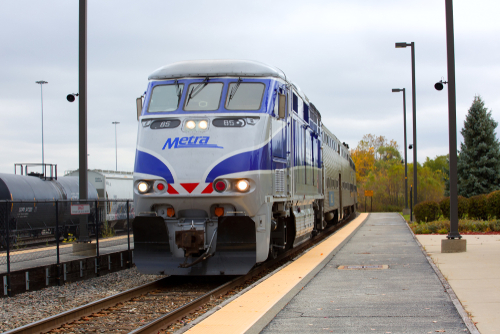
Representatives of the surface transportation industry urged Congress Wednesday to pass the Democratic-sponsored COVID-19 relief package which will provide additional federal funding in the face of the prolonged coronavirus pandemic.
Paul Skoutelas, president and CEO of the American Public Transportation Association, warned lawmakers during a hearing on surface transportation needs that as much as a third of U.S. transit companies are in danger of bankruptcy unless they are bailed out by a $32 billion appropriation targeted in the Health and Economic Recovery Omnibus Emergency Solutions Act, or HEROES Act, which is currently held up in Congress. “Commuter rail is critical to our economy,” Skoutelas told members of the U.S. House Transportation and Infrastructure Committee’s Subcommittee on Railroads, Pipelines, and Hazardous Materials.
“This aid cannot wait,” agreed U.S. Rep. Jesús “Chuy” García (D-IL), one of several Democrats and Republicans defending the calls for additional federal funding.
The proposed funding comes after Congress appropriated $25 billion in emergency transit funding as part of its earlier bill for COVID relief, the Coronavirus Aid, Relief, and Economic Security (CARES) Act.
A handful of Republican members of the panel opposed the funding, including U.S. Rep. Scott Perry (R-PA), who called the proposed HEROES Act funds “a transparent attempt to force taxpayers to bail out commuter lines for problems of their own making.” U.S. Rep. Rick Crawford (R-AR), the ranking Republican on the panel, questioned the continuing grants of large federal subsidies for Amtrak.
U.S. Rep. Tom Malinowski (D-NJ) reminded the recalcitrant Republican lawmakers that all forms of transportation in the U.S. get some kind of federal subsidy, including automobiles, which ride on federal subsidized highways, and airplanes, which travel to and from subsidized airports.
The majority of the witnesses agreed with the need for the additional funds except for, Randal O’Toole, a senior fellow at the libertarian Cato Institute, who argued that ongoing federal subsidies for commuter rail as well as proposed funding of high-speed rail projects is uneconomical.
Coming in for particular criticism was Amtrak, which has experienced a 75 percent decline in ridership since the onset of the pandemic. The passenger train service furloughed 2,050 workers last month and has warned it may have to lay off 2,400 unless HEROES Act funding is passed. “There is an urgent need for Congress to provide supplemental support,” Stephen Gardner, senior executive vice president for Amtrak, told lawmakers.
Several witnesses testified that passenger rail traffic, which plunged after the initial COVID-related shutdown this spring, has failed to rebound, threatening to bankrupt dozens of passenger rail agencies. Romayne Brown, chair of the board of Metra, which provides rail services for metropolitan Chicago, said passenger lines affiliated with Metra are experiencing just 8 percent to 15 percent of their pre-COVID passenger volumes and as a result her agency is facing a $70 million budget shortfall for 2021 unless it obtains relief.
The pandemic has caused fair box reductions of as much as 90 percent for some passenger lines, as well as the loss of other revenue sources, according to Skoutelas.
Subcommittee Chair Dan Lipinski (D-IL) asked the two members of the Surface Transportation Board present whether the regulator is hampered by the two ongoing vacancies on the five-person board. Ann Begeman, chair of the board said there has been no delay in board action so far because there is no requirement that a quorum be present for action by the panel. However, she said deliberations between panel members have been stifled somewhat because of the Sunshine Act ban on a majority of the board (two members now) discussing agenda items in private. As a result, board members are barred from discussing important action matters outside of the board room, she noted.
Also appearing as witnesses at the hearing were: Martin Oberman, vice chair of the Surface Transportation Board, and Ian Jefferies, president and CEO of the Association of American Railroads.